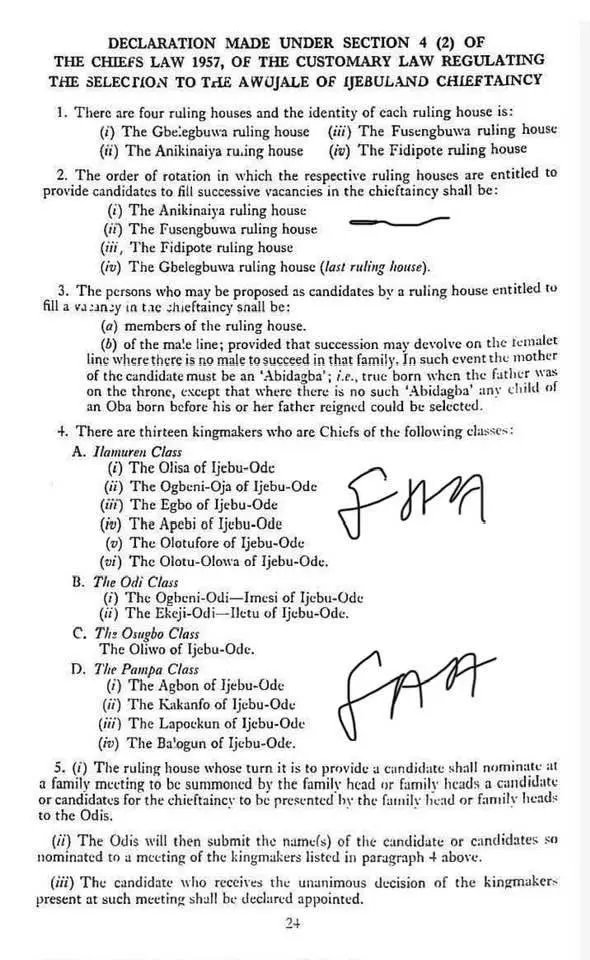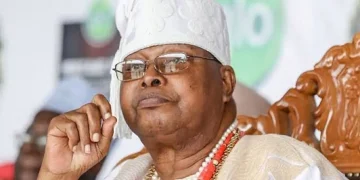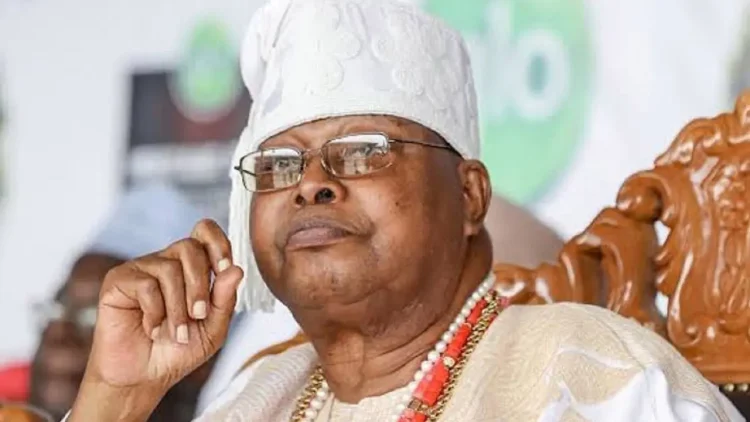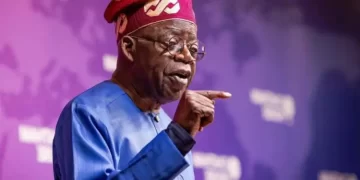As the dust settles following the passing of Nigeria’s longest-reigning monarch, Oba Sikiru Kayode Adetona, the process for selecting his successor as the Awujale of Ijebuland is now officially underway. The revered monarch, who ascended the throne on April 2, 1960, died at the age of 91 and was laid to rest on Monday at his private residence in Ijebu-Ode, Ogun State.
Oba Adetona’s reign spanned over six decades, during which he modernized the traditional institution and became a symbol of resilience, wisdom, and cultural pride for the Ijebu people and the Yoruba nation at large. With his passing, the ancient process to install a new Awujale has begun and it is steeped in custom, law, and ancestral lineage.
Who Will Be the Next Awujale?
According to a document obtained and referenced by Sources, the succession process is guided by a legal framework titled:
“Declaration Made Under Section 4(2) of the Chiefs Law 1957 of the Customary Law Regulating the Selection to the Chieftaincy.”
This declaration outlines the ruling houses eligible for the throne and describes a strict rotational system.
The Four Ruling Houses of Ijebuland
There are four royal families from which an Awujale can emerge:
- Gbelegbuwa Ruling House
- Fusengbuwa Ruling House
- Anikinaiya Ruling House
- Fidipote Ruling House
However, succession is not random. The declaration enforces a rotational order to ensure fairness and balance among the houses. The sequence is as follows:
- Anikinaiya
- Fusengbuwa
- Fidipote
- Gbelegbuwa (which was the last ruling house that produced the late Oba Adetona)
Given that Gbelegbuwa was the last to produce a monarch, it is now Anikinaiya’s turn to present candidates for the throne.
Eligibility Criteria: Who Can Be Crowned Awujale?
The document outlines clear conditions for who can be considered:
- Candidates must be members of the ruling house whose turn it is to nominate.
- They must be from the male line.
- However, if there is no suitable male candidate, a female-line descendant may be considered.
- In such cases, the candidate’s mother must be an ‘Abidagba’ a woman who was a true-born princess when her father (a previous Oba) was reigning.
- If no such Abidagba exists, the child of a former Oba born before his reign may be eligible.
This provision reflects the balance between patrilineal inheritance and traditional inclusivity when circumstances demand it.
The Role of the Kingmakers
The selection process does not end with family nomination. In fact, the ultimate decision rests with the kingmakers; a revered group of traditional chiefs drawn from various customary classes in Ijebu-Ode.
There are thirteen kingmakers in total, categorized into different chieftaincy groups:
A. Ilamuren Class
- The Olisa of Ijebu-Ode
- The Ogbeni-Oja of Ijebu-Ode
- The Egbo of Ijebu-Ode
- The Apebi of Ijebu-Ode
- The Olotufore of Ijebu-Ode
- The Olotu-Olowa of Ijebu-Ode
B. Odi Class
- The Ogbeni-Odi-Imesi
- The Eketa-Odi-Iletu
C. Osugbo Class
- The Oliwo of Ijebu-Ode
D. Pampa Class
- The Agbon of Ijebu-Ode
- The Kakanfo of Ijebu-Ode
- The Lapockun of Ijebu-Ode
- The Ba’ogun of Ijebu-Ode
How the Process Unfolds
Here is a breakdown of the procedure:
-
Nomination by the Entitled Ruling House:
The family head(s) of the ruling house; currently Anikinaiya will convene a meeting to nominate one or more candidates.
-
Submission to the Odis:
The chosen name(s) will be presented to the Odi chiefs, a subgroup within the kingmakers.
-
Final Deliberation by Kingmakers:
The Odis then submit the candidate(s) to a general meeting of all 13 kingmakers.
- If a candidate receives unanimous approval, he is declared the Awujale-elect.
This system reflects a fusion of customary law and democratic consensus, a blend that has helped Ijebuland maintain centuries-old traditions while adapting to modern governance.
What Happens After the Appointment?
After a candidate has been selected and declared as the new Awujale, the process of coronation begins. This includes traditional rites, consultations with Ifá (the Yoruba divination system), and the formal handover of staff of office, culminating in a ceremonial installation often attended by dignitaries from across Nigeria.
A Throne of Legacy and Responsibility
The Awujale is not just a ceremonial figure. The monarch plays a critical role in governance, dispute resolution, and cultural preservation. Under Oba Adetona’s reign, the Awujale title became a voice for progressive monarchy; one that spoke boldly on national issues while remaining rooted in tradition.
As Ijebuland now awaits the emergence of its next monarch, the process being followed is a testament to the structure and wisdom embedded in Yoruba traditional rulership. It ensures legitimacy, continuity, and above all; honour to the ancestors.
See Reference Document Below:






























